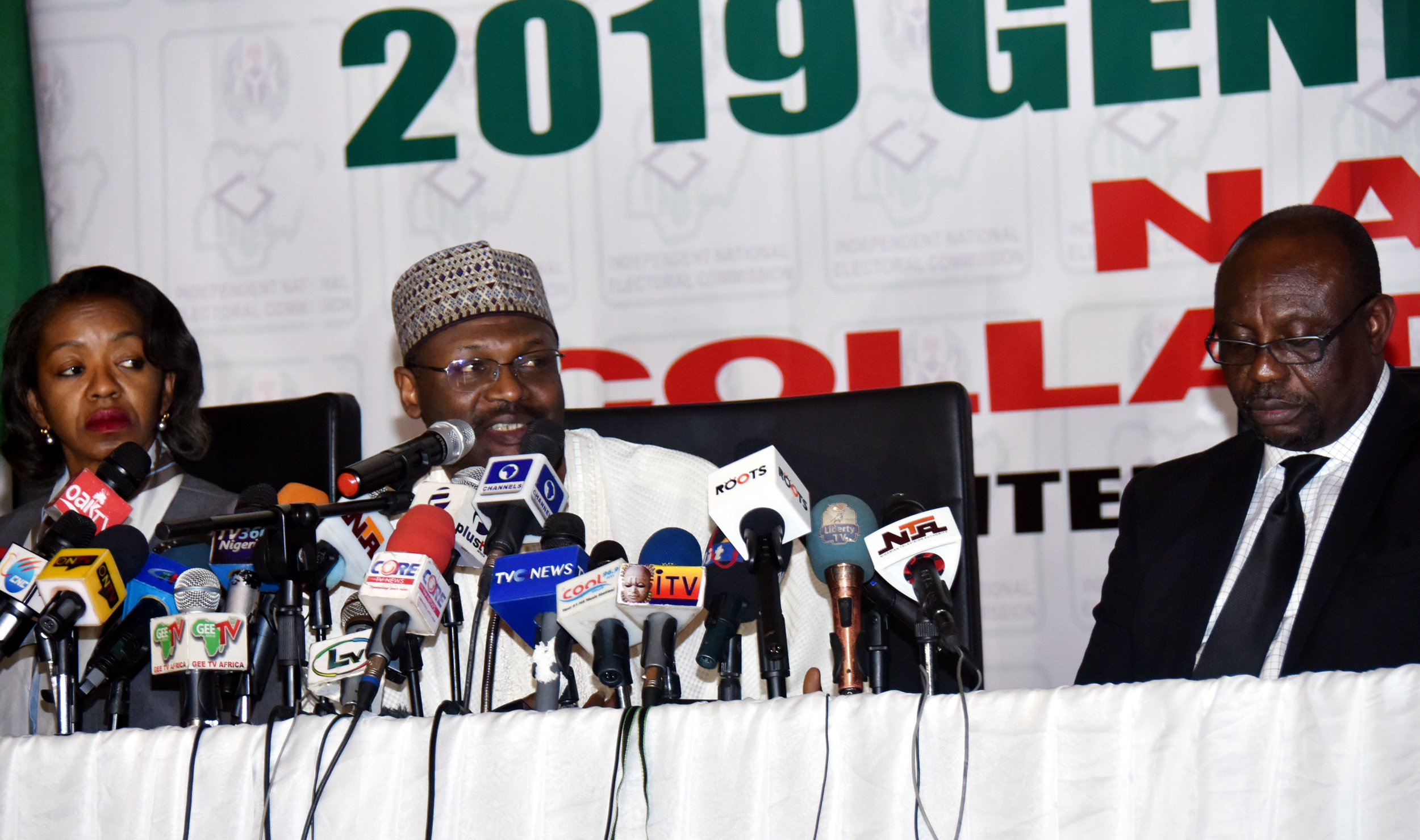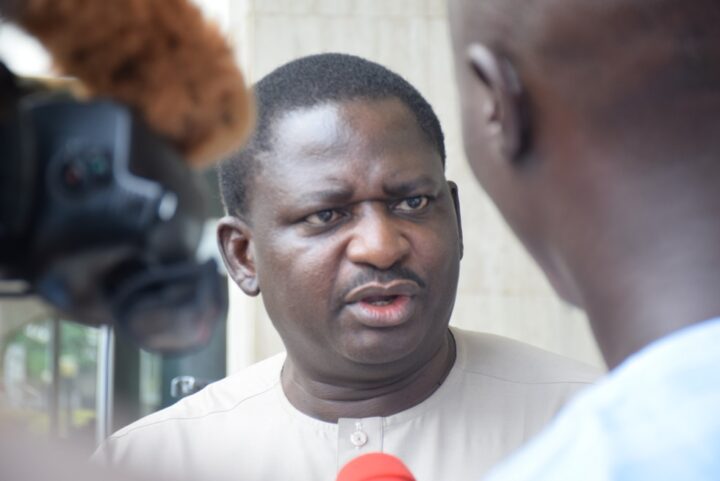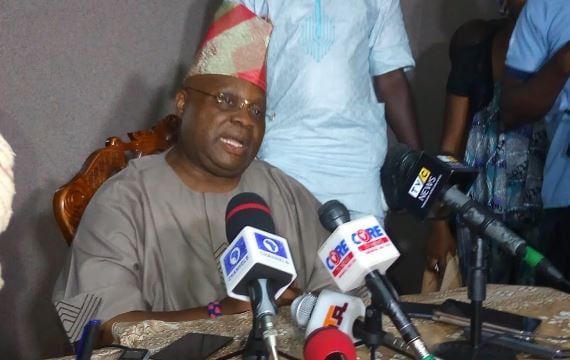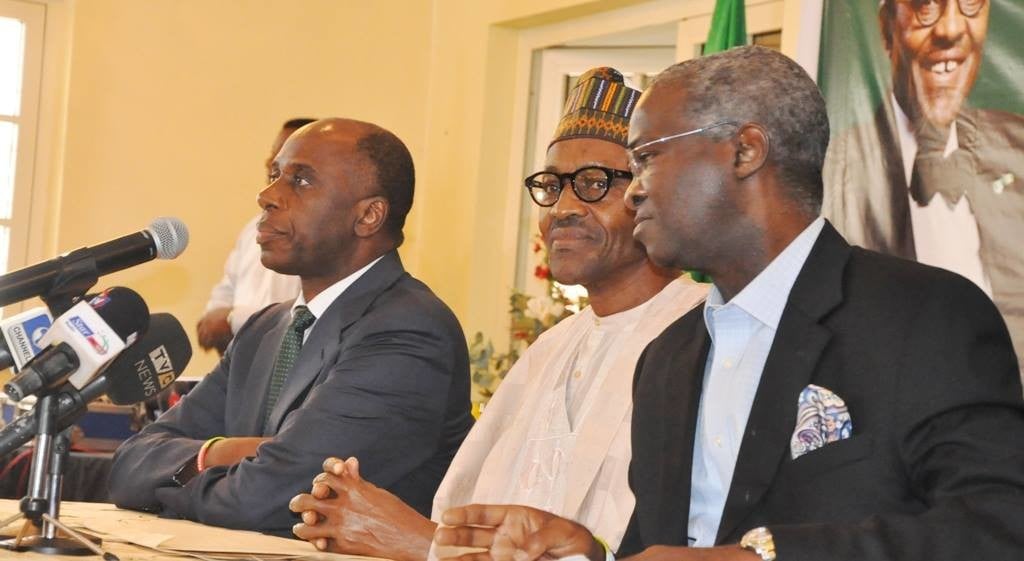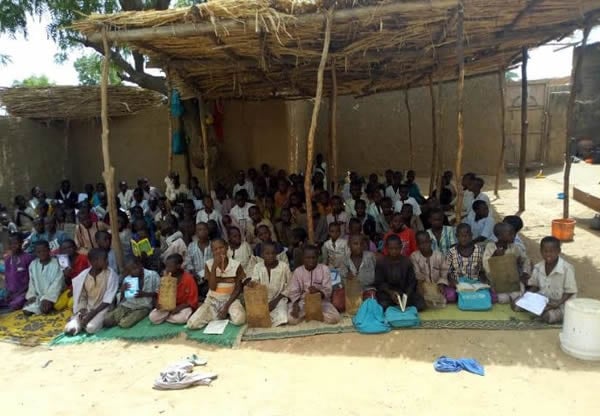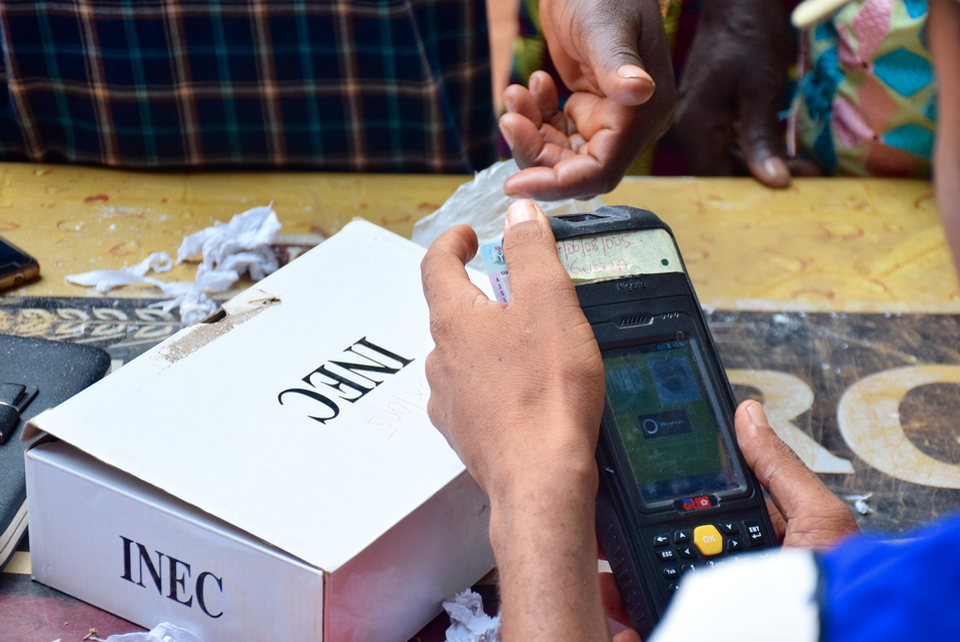Pic 21. From left: Chairperson Legal Services INEC, Mrs May Agbamuche-Mbu; INEC Chairman Prof Yakubu Mahmood and INEC National Commissioner in charge of Voter Education, Mr Festus Okoye during a news conference on the forthcoming Presidential and National Assembly Elections in Abuja on Tuesday (19/2/2019)
01506/19/02/2019/Callistus Ewelike/NAN
BY ALEXANDER IFEANYICHUKWU
“Four years ago, Nigeria held elections that were recognized internationally as free, fair and credible. The 2019 general elections fell significantly short of standards set in 2015. Citizens’ confidence in elections was shaken.”
The above is excerpt from the combined final report of the International Republican Institute (IRI) and National Democratic Institute (NDI) in their assessment of the Nigerian general elections of 2019.Those three sentences tell the story of that election.
In a similar report on the same election, this time from the European Union (EU) Election Observation Mission,the group did not spare the Independent National Electoral Commission (INEC) just like the IRI/NDI.
Advertisement
The summary page of the EU Final Report states, “Nigeria’s 2019 general elections were marked by severe operational and transparency shortcomings, electoral security problems, and low turnout.However, the last-minute postponement of the elections put an undue burden on voters, results’ collation procedures were not sufficiently robust, and inadequate information was provided to the public.”
Other observer groups share the EU and NDI/IRI position. Theses or did tales require a sincere interrogation to why the INEC nosedived in four years from a celebrated election umpire to one that is ridiculed for compounded wrong doings.
Unfortunately, in the usual Nigerian response to subject of deep national concern, individuals in the ruling All Progressives Congress (APC) have busied themselves castigating the reports without justification for the abysmal performance by the Professor Mahmood Yakubu led INEC.
Advertisement
Instead of an appraisal of those things that went wrong with aim of seeking their correction towards restoring voters’ confidence;those who see themselves as beneficiaries of the flawed process are celebrating this ignominious outing.
Worse still, seeking to politicise these objective reports and concerns expressed by institutional partners towards building a virile democracy is nothing but utter wickedness. In recent past, not only have we invited these observers to monitor elections, they have been commended as they conferred credibility on the country’s elections.
Therefore, to view the EU, NDI/IRI Reports from the myopic prism of partisanship is akin to saying that all is well with the conduct of INEC at the 2019 polls.
We should be concerned with this flawed electoral process that has brought in the current political leadership. Indeed, we must settle it in our minds once and for all that every weak electoral process without exception automatically gives birth to unpopular and irresponsible government, at any level.
Advertisement
From the documented reports of the observer groups, the poor conduct and the obvious lacklustre performance by the Independent National Electoral Commission (INEC) is glaring.
The report of the EU Commission is as explicit as it can be. According to the EU, “of the 84 million registered voters, 72.8 million collected their voter cards, 86.6 per cent of the total. Numbers in some states appeared implausibly high, given migration and that the voter register includes names of the deceased. In six states, the collection rate was 94 per cent or more. Such high numbers indicate likely proxy collection and the possibility of PVCs being in the wrong hands.”
More damning are indications that, polling procedures were not always followed,ballot boxes not being sealed; missing essential materials,voting layouts that did not protect secrecy of the vote, voter registers not always ticked as required,smart card readers not always able to read voters’ fingerprints and where such failures occurred, manual authentication procedures not correctly followed, among other obvious infractions.
The report found several other anomalies like voting taking place without the use of smart card readers, despite their use being mandatory,non- compliance with laid down procedure, results forms were not completely filled out, figures on results forms not reconciled, not publicly posting results forms thus reducing the transparency of the election.
Advertisement
The EU Report averred that inconsistent numbers, lack of clear checks and explanations, and insufficient public information undermined the integrity of the election and is not in line with international standards, not to mention the security lapses that inundated the entire election with indictment of the military, among other agencies.
Another critical flaw in the conduct of the election was the INEC 2019 regulations and guidelines which was issued on January 12 and which clarified procedures for the election.However, this contributed to the problem due to noticeable inconsistencies with legislation, “leaving the electoral process vulnerable to subsequent judicial challenge.”
Advertisement
Given the important role of elections in the development of democracy, a critical appraisal of the reports by the European Union Election Observation Mission and observations of the National Democratic Institute, International Republican Institute and other election monitoring reports,has become imperative.
The question that is begging for an answer is how INEC in four years descended from a celebrated electoral umpire into a disoriented, disjointed and untrustworthy state institution, creating in the process an apathetic electorate?
Advertisement
An honest answer to the question of how INEC under Professor Yakubu became subject of ridicule could be traced to the personality of the sitting President who appointed the INEC Chairman and 10 Commissioners since 2015.
The President on four different occasions refused to assent to the amendment bill to the Electoral Act after it was passed by the National Assembly. While in his final refusal of assent on December 6, 2018 President MuhammaduBuhariidentified nearness to the election as his excuse for decliningassent to the bill, the President had declined assent the first time on March 13, 2018.
Advertisement
It is obvious that the reforms contained in the amendment bill would have removed most, if not all of the mine fields that awaited INEC in the conduct of the 2019 general elections.
In essence, INEC and its Chairman were deliberately herded into self-destruct by the same President who appointed them. This calls for a drastic reform in the law authorising the President to appoint INEC Chairman and Commissioners.
Alexander Ifeanyichukwu is a Political Analyst, he writes from Enugu
Views expressed by contributors are strictly personal and not of TheCable.
Add a comment
